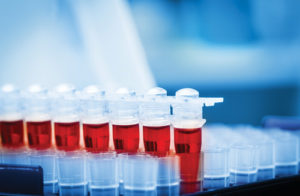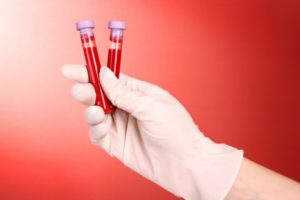Hyperphosphatemia Samples
Bay Biosciences provides high quality, clinical grade, cryogenically preserved sera (serum), plasma and peripheral blood mononuclear cells (PBMC) biofluid samples from patients diagnosed with hyperphosphatemia.
The sera (serum), plasma and PBMC biofluid specimens are processed from hyperphosphatemia patient’s peripheral whole-blood using customized collection and processing protocols. The hyperphosphatemia biofluid samples are collected from unique patients diagnosed with hyperphosphatemia and are provided to a valued pharmaceutical customer for research, diagnostics, discovery and drug development.
Detailed clinical data, patients history, symptoms, complete blood count (CBC), serology, blood phosphate levels of greater than 4.54 mmol/L (14 mg/dL). MRI, histopathology information, elevated biomarker levels, genetic and metabolic information associated with hyperphosphatemia specimens is provided to a valued customer for research, development and drug discovery.
The hyperphosphatemia sera (serum), plasma and peripheral blood mononuclear cells (PBMC) biofluid are processed from patients peripheral whole-blood using customized collection and processing protocols.
Hyperphosphatemia Overview
Hyperphosphatemia is an electrolyte disorder in which there is an elevated level of phosphate in the blood. Hyperphosphatemia or abnormally high serum phosphate levels can result from increased phosphate intake, decreased phosphate excretion, or a disorder that shifts intracellular phosphate to extracellular space. However, even severe hyperphosphatemia is for the most part clinically asymptomatic. Morbidity in patients with hyperphosphatemia is more commonly associated with an underlying disease than with increased phosphate values.
The normal amount of phosphorus in the blood (also called serum phosphorus) is between 2.5 – 4.5 mg/dL. This is for an otherwise healthy person. Having too much phosphorus in the blood is also called hyperphosphatemia. Too much phosphorus in your blood can cause problems. One of these problems is bone disease. Phosphorus works with calcium and vitamin D in your body to keep your bones healthy and strong. To do this, your body’s phosphorus, calcium and vitamin D all need to be in balance. When you have too much phosphorus in your blood, it causes your body to pull calcium from your bones to try and keep your blood balanced. This can cause the bones to become weak and unhealthy. Unhealthy bones put you at higher risk of breaks (fractures) and other problems.
Phosphate is an abundant mineral found in the body. The body store of phosphate is 500 to 800 g, with 85% of the total body phosphate present in crystals of hydroxyapatite in the bone and about 10% found in muscles and bones in association with proteins, carbohydrates, and lipids. The rest gets distributed in various compounds in the extracellular fluid (ECF) and intracellular fluid (ICF). Phosphate is also present in nucleic acids and acts as an important intracellular buffer.
Normal adult dietary phosphate intake is around 1000 mg/day. 90% of this is absorbed primarily in the jejunum. In the small intestine, phosphate is absorbed both actively and by passive paracellular diffusion. Active absorption is through sodium-dependent phosphate co-transporter type IIb (NPT2b).
Kidneys excrete ninety percent of the daily phosphate load while the gastrointestinal tract excretes the remainder. As phosphorus is not significantly bound to albumin, most of it gets filtered at the glomerulus. Therefore, the number of functional nephrons plays a significant role in phosphorus homeostasis; 75% of filtered phosphorus is reabsorbed in the proximal tubule, approximately 10% in the distal tubule, and 15% is lost in the urine. In the luminal side of the proximal tubule, the primary phosphorus transporter is the Type II Na/Pi co-transporter (NPT-2a). The activity of this transporter is increased by low serum phosphorus and 1,25(OH)2 vitamin D, increasing reabsorption of phosphorus. Renal tubular phosphorus reabsorption also increases by volume depletion, chronic hypocalcemia, metabolic alkalosis, insulin, estrogen, thyroid hormone, and growth hormone. Tubular reabsorption of phosphorus decreases by parathyroid hormone, phosphatonins, acidosis, hyperphosphatemia, chronic hypercalcemia, and volume expansion.
Healthy kidneys also help keep the bones healthy, they do this in two ways:
- Kidneys keep the right amounts of phosphorus and calcium in the body. When the kidneys are not working well, too much phosphorus can build up in the blood. This is called hyperphosphatemia.
- Kidneys also help the body use vitamin D. When your kidneys are not working, your body may not be able to use vitamin D like it should. This can also cause your bones to get weak.
Too much phosphorus or not enough vitamin D in the blood puts you out of balance. The body tries to “fix” this by making more of a hormone called parathyroid hormone (PTH). When your parathyroid makes too much PTH, it’s called secondary hyperparathyroidism. PTH pulls calcium from your bones to try and put your blood back in balance. This loss of calcium can eventually cause bone disease.
Signs and Symptoms of Hyperphosphatemia
Many people with high phosphate levels don’t have any signs and symptoms. In some patients with chronic kidney disease, high phosphate levels cause calcium levels in the blood to drop.
Symptoms of low calcium include:
- Muscle cramps or spasms
- Numbness and tingling around the mouth
- Bone and joint pain
- Weak bones
- Rash
- Itchy skin

Causes of Hyperphosphatemia
Most people get about 800 to 1,200 milligrams (mg) of phosphorus daily from foods like red meat, dairy, chicken, fish, and fortified cereal. In the body, phosphate is found in the bones and teeth, inside the cells, and in much smaller amounts in the blood. The kidneys help remove extra phosphate from your body to keep the levels in balance. When your kidneys are damaged, your body can’t remove phosphate from your blood quickly enough. This can lead to chronically elevated levels of phosphate.
The blood phosphate level can also rise abruptly if you receive a phosphorus-containing laxative as preparation for a colonoscopy.
Other possible causes of hyperphosphatemia include:
- Low parathyroid hormone levels (hypoparathyroidism)
- Damage to cells
- High vitamin D levels
- Diabetic ketoacidosis high levels of acids called ketones in the blood of people with diabetes
- Injuries, including those that cause muscle damage
- Serious body-wide infections
Complications of Hyperphosphatemia
Calcium combines with phosphate, which leads to low levels of calcium in the blood (hypocalcemia). Low calcium in the blood increases patients risks for:
- High parathyroid hormone levels (secondary hyperparathyroidism)
- Seizures
- Bone disease called renal osteodystrophy
Because of these complications, patients with severe kidney disease who have high phosphate levels in their blood have an increased risk of death.
Hyperphosphatemia is often a complication of chronic kidney disease. One way to reduce the risk is by slowing kidney damage. Protect your kidneys by treating the cause of your kidney disease.
- High blood pressure can weaken the blood vessels that supply oxygen-rich blood to the kidneys. Taking blood pressure medications like angiotensin-converting enzyme (ACE) inhibitors or angiotensin II receptor blockers can lower your blood pressure and protect the kidneys.
- Extra fluid in the body can overwhelm the damaged kidneys. Taking a water pill (diuretic) can help restore the correct fluid balance in the body.

Bay Biosciences is a global leader in providing researchers with high quality, clinical grade, fully characterized human tissue samples, bio-specimens and human bio-fluid collections from cancer (tumor) tissue, cancer serum, cancer plasma cancer PBMC and human tissue samples from most other therapeutic areas and diseases.
Bay Biosciences maintains and manages it’s own bio-repository, human tissue bank (biobank) consisting of thousands of diseased samples (specimens) and from normal healthy donors available in all formats and types. Our biobank procures and stores fully consented, deidentified and institutional review boards (IRB) approved human tissue samples and matched controls.
All our human human tissue collections, human specimens and human bio-fluids are provided with detailed samples associated patient’s clinical data. This critical patient’s clinical data includes information relating to their past and current disease, treatment history, lifestyle choices, biomarkers and genetic information. Patient’s data is extremely valuable for researchers and is used to help identify new effective treatments (drug discovery & development) in oncology, other therapeutic areas and diseases. This clinical information is critical to demonstrate their impact, monitor the safety of medicines, testing & diagnostics, and generate new knowledge about the causes of disease and illness.
Bay Biosciences banks wide variety of human tissue samples and biological samples including cryogenically preserved -80°C, fresh, fresh frozen tissue samples, tumor tissue samples, FFPE’s, tissue slides, with matching human bio-fluids, whole blood and blood derived products such as serum, plasma and PBMC’s.
Bay Biosciences is a global leader in collecting and providing human tissue samples according to the researchers specified requirements and customized, tailor made collection protocols. Please contact us anytime to discuss your special research projects and customized human tissue sample requirements.
Bay Biosciences provides human tissue samples (human specimens) from diseased and normal healthy donors; including peripheral whole-blood, amniotic fluid, bronchoalveolar lavage fluid (BAL), sputum, pleural effusion, cerebrospinal fluid (CSF), serum (sera), plasma, peripheral blood mononuclear cells (PBMC’s), saliva, Buffy coat, urine, stool samples, aqueous humor, vitreous humor, kidney stones, renal calculi, nephrolithiasis, urolithiasis and other bodily fluids from most diseases including cancer. We can also procure most human bio-specimens and can do special collections and requests of human samples that are difficult to find. All our human tissue samples are procured through IRB approved clinical protocols and procedures.
In addition to the standard processing protocols Bay Biosciences can also provide human plasma, serum, PBMC bio-fluid samples using custom processing protocols, you can buy donor specific sample collections in higher volumes and specified sample aliquoting from us. Bay Biosciences also provides human samples from normal healthy donors, volunteers, for controls and clinical research, contact us Now.
日本のお客様は、ベイバイオサイエンスジャパンBay Biosciences Japanまたはhttp://baybiosciences-jp.com/contact/までご連絡ください。


